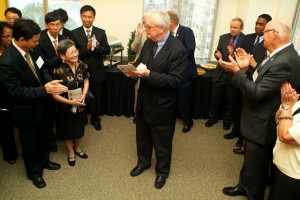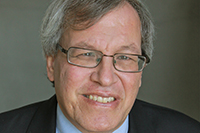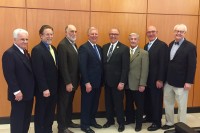
Dean John E. Corkery (center) leads the round of applause for Dorothy In-Lan Wang Li, the driving force behind John Marshall’s nearly 20-year working relationship with the China’s State Intellectual Property Office, and the newly opened Chinese IP Resource Center.
A delegation of dignitaries from China came to The John Marshall Law School to join with faculty, staff and guests for the grand opening of the Chinese Intellectual Property Resource Center on Tuesday, Aug. 23, 2011.
A red ribbon at the entrance of the Center was clipped by seven representatives from the law school, the Chinese intellectual property (IP) community and the legal community. The celebration marks the culmination of nearly two years of work to develop the Center that is destined to be a helping hand for global attorneys looking for current information on China’s intellectual property law.
The Center was founded in response to the growing importance of Chinese IP laws and issues in connection with world commerce and IP development. The Center has been the dream of Dean John E. Corkery and Dorothy In-Lan Wang Li, director of the law school’s Asian Alliance Program. They first approached Chinese attorneys about the idea for a Center two years ago when John Marshall and the China’s State Intellectual Property Office (SIPO) marked the 15th anniversary of their cooperative partnership.
Leonard Amari, president of the law school’s board of trustees, together with Corkery and Li, welcomed guests, including Gan Shaoning, the deputy commissioner of SIPO; Lu Kun, the deputy consul general of the Chinese Consulate in Chicago; Ma Hao, president of the Patent and Trademark Law Office in Beijing and representative of the China Council for Promotion of International Trade; Yufeng (Ethan) Ma, a board member at McAndrews Held & Malloy Ltd.; Chief Judge James Holderman and Judge Charles Kocoras of the United States District Court-Northern District of Illinois; Judge Michael Mihm of the United States District Court for the Central District of Illinois; and William Spence, co-chair of the Chicago Sister Cities International Program- China Committee.
“The Center is a testament to what can be done when we and our partners work together,” Corkery told those gathered for the ceremony. “I see it as a dream come true, but it is still just the beginning” of what is possible.
Gan said since the partnership between John Marshall and SIPO began nearly 20 years ago, more than 170 attorneys have studied for an LLM degree in IP law at John Marshall, and more than 600 Chinese attorneys have had some training through the law school.
“All of these achievements of SIPO and The John Marshall Law School are because of the cooperation between the United States and China in the IP field,” Gan noted.
Lu said the development of the Center speaks to the cooperation and mutual relations between the two countries. “The United States is the most powerful in technology and the most sophisticated in patents, but the Chinese technology is developing very fast,” he said.
When Li and Arthur Yuan, executive director of the Center, talked with Ma in Beijing about the Center’s work, he remembers “I was very excited. This is a very important bridge and the U.S. can learn Chinese law here, as well as the Chinese students here.”
As a native of China now practicing law in the United States, Yufeng Ma said John Marshall “has made a profound impact on my life. Since 1994, I’ve heard about this law school and the training programs. In 2000, I came to Chicago to worship this school and say ‘thank you’ for all you did for China.”
At the ceremony, Ma represented the one U.S. law firm—McAndrews Held & Malloy Ltd.—that made a donation to the Center. Li said she knows many law firms pulled back on their commitment because of the economy, but she encouraged them to reconsider their decisions.
“It’s a challenge,” she said. “Let’s match what we have. It takes everyone’s support.” Names of the founding donors displayed on the wall just inside the Center are: King & Wood, U.S.-China Legal Cooperation Fund, CCPIT Patent and Trademark Law Office, Liu, Shen & Associates, www.chinalawinfo.com, Fangda Partners, McAndrews Held & Malloy Ltd., Richard S. Gruner, Tze-Chang & Dorothy In-Lan Wang Li, William T. McGrath, Mrs. Terry Jackley Medhurst and Jie Sha.
The Center’s focus is on making Chinese information available to IP practitioners. Chinese IP laws and enforcement practices have changed rapidly, and laws have been altered in fundamental ways as China has sought to increase both its commercial activities and its adherence to international IP standards.
Through the Center, The John Marshall Law School is providing resources on the latest Chinese rules and laws. The Center staff has worked with SIPO officials, leading judges and practitioners to identify documents and analyses on important IP standards, issues and practices to be made available via the Internet.
Benjamin Liu, director of the Center, will be organizing programs for IP specialists on substantive features of developing IP laws and practices in China. In addition, he will coordinate the Center’s efforts to bring together IP scholars with interests in China for conferences. The Center will extend visiting appointments to Chinese IP scholars and U.S. and international scholars with interests in Chinese IP developments.


